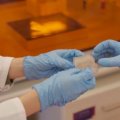Researchers recommend good WEIP at work
University of Queensland researchers have developed the first known model of emotional intelligence - how well people deal with their emotions - in workgroups.
Graduate School of Management Associate Professor Neal Ashkanasy, senior lecturer Dr Charmine Hartel and PhD student Peter Jordan developed the Workgroup Emotional Intelligence Profile (WEIP) in questionnaire form.
The model has been developed as part of a broader study into the causes and consequences of emotions at work funded by a three-year, $184,000 Australian Research Council (ARC) Large Grant. Co-investigators include Dr Cynthia Fisher from Bond University and Dr Blake Ashforth from Arizona State University.
According to Dr Ashkanasy, the grant was the largest sum (by $50,000) ever granted to a study in the management field by the ARC Large Grant scheme.
Dr Hartel said emotions at work was an area neglected by both organisations and management science because of an outmoded emphasis on the need for workers to refrain from any display of emotion, often seen as a sign of weakness.
As a result, managers and management researchers had viewed the study of emotions in the workplace as off-limits, she said.
"Controlling emotions in the workgroup has traditionally been a key part of controlling workers. People are encouraged to act as robots and this is increasingly out-of-step with work becoming more cognitive and creative rather than physical," she said.
Emotions were a vital factor in both job satisfaction and staff turnover with job satisfaction a major influence on performance and productivity, she said.
Dr Ashkanasy said emotional intelligence was the ability not only to read and understand your own emotions and those of others, but to use such information in problem-solving. People with high emotional intelligence were better equipped to deal with work hassles, he said.
"For example, in a situation of high job insecurity, a person with low WEIP may become withdrawn, self-interested or even sick whereas a high WEIP person continues to keep the organisation's goals in mind and builds social networks as a buffer to the work group stress," he said.
The WEIP model will eventually be tested on several hundred workers who have already been recording their emotions at work for Dr Fisher. In this way, individual characteristics and skills known about the workers (their WEIP) can be compared with the way they cope in their workgroups (environment).
In another part of the project, Dr Fisher is pioneering a method to measure emotions at work. In her study, workers wear special wrist-watches for two weeks that beep at random times during the day to remind workers to record their feelings.
She said her preliminary results suggested that rather than rewarding workers once in a while with a pay rise or a "pat on the back", a better strategy to prevent negative emotions would be to manage the many small hassles (for example, bad-tempered customers or colleagues, having to cover for someone else's incompetence) which accumulate to create them.
Dr Ashforth is an expert in the area of emotional labour - when people have to display certain emotions as part of their job. Dr Hartel said these workers included airline cabin crew who must display an upbeat demeanour at all times - a requirement which could cause stress.
The researchers will also be testing a model known as Affective Events Theory for the first time. This theory was proposed in 1995 by American researchers Dr Howard Weiss and Dr Russell Cropanzano but has never been tested.
Dr Ashkanasy said the essence of this theory was that many emotions in workgroups emanated from particular events and had consequences for workgroup satisfaction and productivity.
The researchers held the first Emotions in Work Life conference at San Diego State University in August 1998 and are planning a caucus on the same topic as part of the Academy of Management meeting in Chicago in August this year. They have also established a web site to bring together research and researchers in the field entitled "Emonet" (www.uq.edu.au/emonet/).
For more information, contact Dr Ashkanasy (telephone 07 3365 7499) or Dr Hartel (telephone 07 3365 6747).
.jpg)



